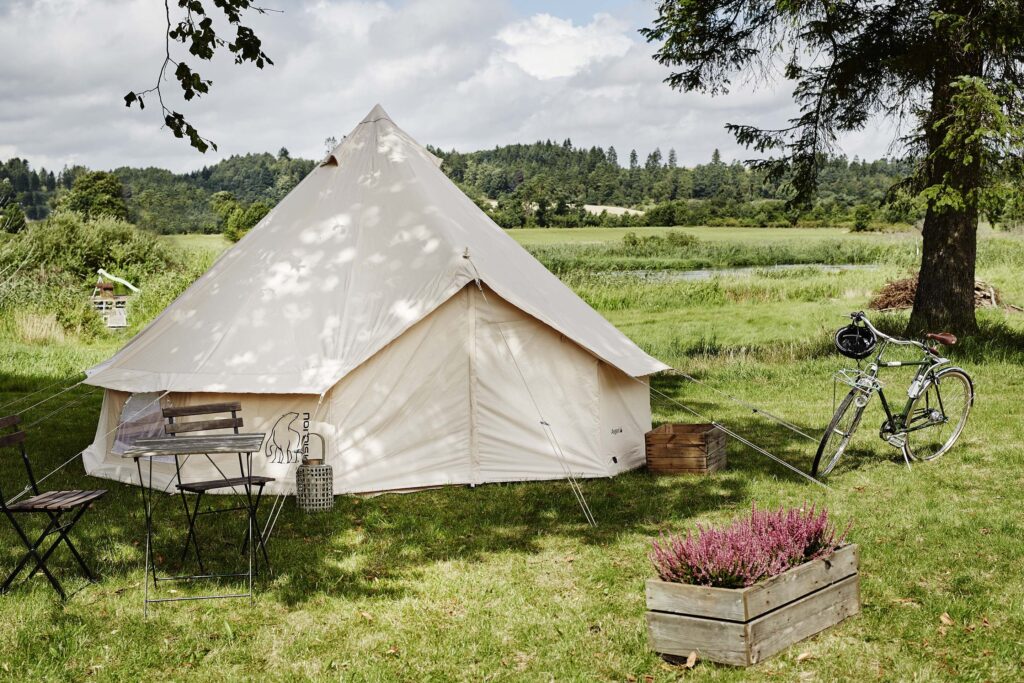Looking for a new tent this Summer? Have a read on the pros and cons of both polyester and polycotton flysheets and decide which suits you better.
…
Choosing the right tent can be really tricky, especially with the pressure of a Summer’s adventures on the line. One of the questions we are most often asked is what are the key differences between polycotton and polyester flysheets. In truth, there are many reasons why someone may prefer one over the other and there are enough advantages to say that one does not outperform another overall, there is no better option to cover all factors. This is why we have broken down the pros and cons of each in order to help you choose what is right for you. If you have any doubts still, why not pop into one of our stores and ask us in person? We’ll be able to give you the best idea of what you’re looking for.

What types of polyester tents and awnings are there out there?
To start, polyester is a form of plastic which is able to be woven into fine threads and then weaved together make fabrics, you’ll find polyester used throughout the fashion and outdoor industries being used for clothing and all types of fabric based goods such as tents. When talking about tents, we need to talk about different deniers (the thickness of the fibres in the tent fabric). Your standard entry level tent will normally have a denier from 70 to 150, this is because it is lightweight whilst still being able to deal with whatever our great british weather can throw at it. TYou will find more premium tents use a higher denier as they are designed to be used longer throughout the camping season and need to be tougher for extended use, this will normally go up to around 420 denier. The vast majority of polyester tents (both technical and family based designs) will also utilise a membrane meaning they are effectively waterproof.
Advantages of a Polyester tent
- Polyester tents are lighter than polycotton tents. When comparing weight of the fabric, Polyester is king. This is why you’ll always find that backpacking tents are made solely with a polyester or other synthetic fabric, making them easier to carry long distance. This lower weight also makes a family tent more practical and easier to pitch.
- Polyester tents have a wider range of deniers depending on what you need. As mentioned above, polyester tents are available in different deniers, this makes them perfect for people new to camping who only need something basic for a weekends camping, or for people who plan to camp long into each season.
- Polyester tents are highly waterproof. This makes them perfect for British weather.
- Polyester tents are quicker to dry out. Given the non-porous nature of polyesters fibres, you’ll find that polyester flysheets dry much more quickly than polycotton options.
- Polyester is more affordable. In general, you’ll find far more cost effective polyester options on the market
Disadvantages of polyester
- Condensation. Polyester on the whole, does not breath well. Because of this, you’ll encounter condensation which not only mists up your tent windows but also leaves the tent feeling clammy and you may find the mist even pools. To counter this however, good polyester tents will come with plenty of vents fitted, allowing air to move through the tent and keep things breathing.
- Breathability. As just mentioned, thanks to the waterproof polyester fabric, a polyester tent will not breathe well without its vents opened and a light breeze. This is especially the case if the tent also features a sewn-in groundsheet. In hot weather this will leave the tent very stuffy and warm as it soaks up the sun without letting the air out. It should also be noted that on colder nights, polyester does not hold any warmth, making them also less well-suited to early season camping.
- Overall Durability. If you’re wanting to prioritise optimal lifespan, then lower spec polyester tents are not a good option. This means that you’ll either need to splash out on a higher denier option or opt for polycotton tents instead.
Overall Polyester makes a great option for many different kinds of camper. The first time camper will find a very forgiving, lighter weight structure to pitch over the weekend. Someone looking to prioritise low weight will find a great selection of options. For those looking to be camping in the rain, you cannot beat polyester’s waterproof treatments and for those who want a tent to use maybe once or twice a year, polyester makes a superb option.

What sort of polycotton tents are available?
Polycotton is a blend of both polyester and cotton and is often used as a more premium option for the added qualities that cotton brings. You’ll find polycotton used for both premium family tunnel tents as well as a plethora of glamping options such as bell tents and even intrepid basecamp models such as Nordic tipis.
Advantages of a polycotton tent
- Polycotton is quieter in the wind. As a thicker and softer fabric, polycotton will not make the same high volume rustling sound of polyester.
- Polycotton is more adaptable to different climates. This is its major pro and often what the connoisseur camper will be looking for. Polycotton breathes far more effectively than polyester meaning that the tent will be considerably cooler and more comfortable to sit in on even the hottest days. Additionally, thanks to the insulating properties of cotton, the fabric will be able to hold more warmth on cooler nights making polycotton options superior in comfort in a variety of different climates.
- Polycotton is more durable. For those looking to camp often over the season in different locations, polycotton options are more resistant to both the rough and tumble of outdoor life as well as being more resistant to UV from the sun over long summers.
- Polycotton builds a stronger structure. Polycotton is far stronger than polyester when dealing with the wind. This is largely due to its higher weight.
Disadvantages of polycotton tents
- Polycotton tents are heavier. The fabric is considerably heavier than polyester. This makes it harder to carry and sometimes harder to pitch. You will find that heavier family tents will often need at least two strong adults to lift them out of the car.
- Polycotton tents have a larger pack size. Again, thanks to a heavier, thicker fabric, when packed, polycotton tents will take up more space in the car and where you’re storing them when not in use.
- Polycotton tents need weathering. This is a process of pitching the tent before proper use and getting it wet! This is so the threads can swell and optimise the tent for proper use later on in wetter conditions. When the fabric is made wet and then allowed to dry, the threads will tighten, making the tent stronger and ready for proper use.
Polycotton tents are superb for a lover of cosy camping, for those who love to hang out in the tent all day dozing, reading and enjoying themselves due to their superior breathability and comfort. Thanks to this adaptability, polycotton tents make far more superior options for those camping in hotter countries on the continent. The durability of the fabric also makes it better for more frequent campers and the adaptability of the cotton content makes it better for cooler nights as well meaning families can start camping earlier in spring and later into autumn.








